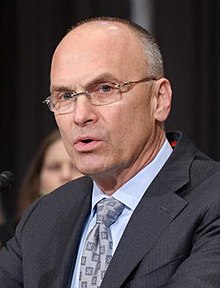Andrew Puzder
| Andrew Puzder | |
|---|---|
 |
|
| Born |
Andrew Franklin Puzder July 11, 1950 Cleveland, Ohio, U.S. |
| Education |
Cleveland State University (BA) Washington University (JD) |
| Salary |
|
| Political party | Republican |
| Spouse(s) | Lisa Fierstein (1973–1987) Deanna Descher (1987–present) |
| Children | 6 |
Andrew Franklin "Andy" Puzder (born July 11, 1950) is an American businessman. He is the former chief executive officer of CKE Restaurants, the parent company of Hardee's and Carl's Jr., a position he held from September 2000 to March 2017. He was previously a lawyer in private practice, where he was active in opposing abortion.
On December 8, 2016, Puzder was nominated by President-elect Donald Trump to be the Secretary of Labor, but on February 15, 2017, he withdrew due to lack of votes needed to his confirmation.
Puzder was born on July 11, 1950, in Cleveland, Ohio, the son of Winifred M. (Franklin) and Andrew Frank Puzder. He grew up in Russell Township. He attended Kent State University and dropped out in 1970 following the Kent State shootings. According to Puzder, he then "spent the next three years attending concerts and marching on Washington." While living in Cleveland Heights, Puzder worked in sales at a guitar studio and attended Cleveland State University, receiving a BA in history in 1975. He then attended Washington University School of Law where he was editor of the Washington University Law Quarterly, receiving his JD in 1978.
From 1978 to 1983, Puzder was an associate at the law offices of St. Louis attorney Morris Shenker, practicing corporate law. In 1984 he moved to the Stolar Partnership and worked with trial attorney Charles A. Seigel. He also served as a trial lawyer in St. Louis until 1991.
During the 1980s and early 1990s, Puzder was considered Missouri's leading anti-abortion lawyer and was active in the anti-abortion group Lawyers for Life. In 1984, Puzder and another lawyer wrote an article for the Stetson Law Review proposing a Missouri law that would define life as beginning at conception in the broad context of contract or property law. Puzder reasoned that if fetuses were recognized as having rights in other contexts, it would establish a foundation for challenging Roe v. Wade later on.
...
Wikipedia
